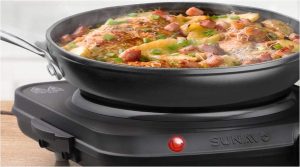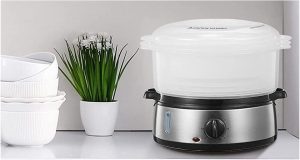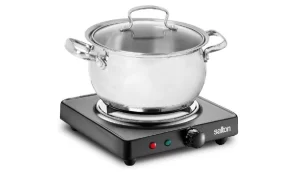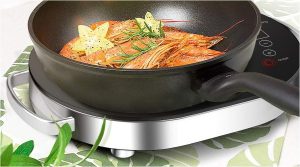Which Cooking Utensils Are Safe? Can Nylon be Considered?
Note: This article may contain affiliate links, which means if you make a purchase following our links won’t cost you extra, but we may earn a commission. Learn more
Nylon cooking utensils are typically considered by some to be safe. Yet, there are concerns about certain chemicals, such as diamino-diphenylmethane (DDM) in some black nylon items.
In the vast array of kitchen tools, the choice between nylon and silicone utensils often emerges as a topic of interest. Silicone, known for its safety and impressive heat resistance, has become a favorite among many.
Especially for frying tasks, silicone spatulas have been preferred due to their ability to withstand high temperatures. Nylon, while useful, has its limitations. These utensils are known to be stick-resistant and can handle temperatures up to 400 °F. Beyond this point, they risk degrading or even melting, which could pose health risks.
The debate between nylon and silicone often revolves around safety and functionality. Some experts suggest avoiding utensils made from materials like nylon, plastic, aluminum, copper, and Teflon due to potential health concerns.
Instead, materials such as stainless steel, silicone, bamboo, and wood are often recommended. Glass, ceramic, cast iron, and silicon are also recognized for their safety in the kitchen. Making the right choices in kitchen tools not only ensures the quality of meals but also promotes a healthier cooking environment.
Related: Wooden Spoon Vs. Metal Spoon: Which One Is Better?
are nylon cooking utensils safe?
Nylon, a widely used material in kitchen tools, has raised questions about its safety. The chemical composition of nylon utensils has been a topic of interest, especially with the detection of diaminodiphenylmethane (DDM) in certain black nylon products. This chemical has been a concern for many health enthusiasts.
Beyond chemical composition, nylon’s heat resistance is another focal point. The material can handle temperatures up to 400 °F, but beyond this, there’s a risk of degradation or even melting.
In comparison to other materials like silicone or metal, nylon might have some limitations, especially for tasks that involve high temperatures.
Read More: Which Cooking Utensils Are Safe? Can Nylon be Considered?
Silicone vs. Nylon: A Comparative Study
The kitchenware market has seen a surge in silicone utensils and for good reasons. Silicone boasts impressive heat resistance, making it a preferred choice for frying and other high-temperature cooking methods. Its durability ensures a longer lifespan, resisting wear and tear.
Feedback from users, especially on platforms like Reddit, often leans towards silicone, praising its resilience and safety features over nylon.
Potential Health Concerns with Various Cooking Utensils
The materials we use in our kitchen can directly impact our health. While nylon has its set of concerns, other materials like plastic, aluminum, copper, and Teflon also come with their set of challenges.
These materials, especially when exposed to high temperatures, might release harmful substances.
It becomes imperative, then, to choose utensils that prioritize health and safety, ensuring that our food remains uncontaminated and safe to consume.
Read More: 8 Best Scratch-Resistant Dinner Plates
The Safest Materials for Cooking Utensils
Safety in the kitchen goes beyond just the food we eat; it also involves the tools we use.
Materials like stainless steel, silicone, bamboo, wood, and ceramic have emerged as top choices for those who prioritize safety. Each of these materials brings its unique set of benefits, from the robustness of stainless steel to the eco-friendliness of bamboo.
Glass and cast iron also play pivotal roles in the kitchen, known for their non-reactive nature.
Learn More: Wooden Spoon Vs. Stainless Steel: Choose the Right One
The Rise of Non-Plastic and Non-Toxic Cooking Tools
With an increasing global emphasis on health and sustainability, there’s a noticeable trend towards non-plastic and non-toxic kitchen tools.
Wooden tools, for instance, are not only environmentally friendly but also add an aesthetic touch to the kitchen. The demand for such toxic-free utensils underscores a broader shift in consumer behavior, where health and sustainability are at the forefront of purchasing decisions.
This trend is a testament to the growing awareness and the collective effort to make kitchens safer and more eco-friendly.
3 Best Cooking Utensils Set
1. OXO Good Grips 4-Piece Nylon Tool Set
Transform your cooking experience with the OXO Good Grips 4-Piece Nylon Tool Set. This thoughtfully designed set includes a Square Turner, Spoon, Slotted Spoon, and Spaghetti Server, all crafted from premium nylon that guarantees durability and performance.
With oversized heads and extra-long, sturdy necks, these utensils make cooking and serving a breeze. The heat-resistant design allows them to withstand temperatures up to 400°F, ensuring they are perfect for various cooking tasks without the fear of melting or warping.
Not only are these tools incredibly functional, but they also feature soft, non-slip handles that provide a comfortable grip, making them easy to use for extended periods. Plus, they are dishwasher safe, allowing for quick and hassle-free cleanup. Safe for use on non-stick cookware, the OXO tool set ensures that your pots and pans remain scratch-free while you whip up your favorite dishes.

Key Benefits
- Heat-resistant up to 400°F
- Safe for non-stick cookware
- Soft, non-slip handles for comfort
- Dishwasher safe for easy cleaning
- Durable nylon construction
Compatible For
- Non-stick cookware
- Everyday cooking tasks
- Easy storage solutions
2. Umite Chef Kitchen Cooking Utensils Set
Elevate your culinary experience with the Umite Chef Kitchen Cooking Utensils Set. This extensive 33-piece collection features high-quality, food-grade silicone utensils that are both BPA-free and safe for all foods. With a striking khaki color and wooden handles, these utensils not only enhance your kitchen’s aesthetic but are designed for durability and comfort.
Whether you’re flipping, stirring, or serving, these utensils are engineered to withstand high temperatures up to 446°F (230°C), ensuring they won’t bend, break, or rust over time.
Each utensil is thoughtfully designed to protect your cookware from scratches and dents, making them ideal for non-stick surfaces. The set includes everything you need, from spatulas to measuring spoons, and comes with handy storage hooks and a silicone mat for added convenience. Embrace the joy of cooking with tools that truly support your culinary creativity!

Key Benefits
- Food-grade silicone for safety
- High-temperature resistance
- Durable wooden handles
- Scratch-resistant design
- Comprehensive 33-piece set
Compatible For
- Non-stick cookware
- Various cooking styles
- Kitchen storage solutions
3. Zulay Kitchen Wooden Spoon Set
Discover the elegance and functionality of the Zulay Kitchen 6-Piece Wooden Spoon Set. Crafted from premium teak wood, these utensils combine sophistication with practicality.
Each piece, including a salad spoon, serving spoon, and spatula, is designed ergonomically for comfortable use, making stirring and serving a breeze. The smooth finish and water-resistant properties of teak make these spoons not only beautiful but also incredibly durable.
Cleaning is effortless; a simple rinse with soap and water is all it takes to maintain their stunning gloss. Plus, their scratch-free design ensures your non-stick cookware stays in pristine condition. Whether you’re an experienced chef or a cooking enthusiast, this set is the perfect addition to your kitchen arsenal, making it an ideal gift for any occasion!

Key Benefits
- High-quality teak wood construction
- Ergonomic design for comfort
- Scratch-free for non-stick cookware
- Easy to clean and maintain
- Elegant addition to any kitchen
Compatible For
- Non-stick cookware
- Various cooking techniques
- Gift occasions like housewarmings
Common Questions and Answers
Do Nylon Utensils Scratch Cookware?
Nylon utensils are generally designed to be non-abrasive, making them suitable for non-stick cookware. Their soft and flexible nature ensures that they don’t leave scratches on pots and pans.
How Long Do Nylon Cooking Utensils Last?
The lifespan of nylon utensils varies based on usage and care. With proper care, they can last several years. It’s advisable to replace them if they show signs of melting, chipping, or cracking.
Can Nylon Utensils Be Used in the Oven?
Nylon utensils are not recommended for oven use. They have a heat resistance limit, typically up to 400 °F, and can melt or degrade at higher temperatures.
Is There a Taste or Smell Transfer with Nylon Tools?
Quality nylon utensils should not impart any taste or odor to the food. If there’s a noticeable smell or taste transfer, it might be time to replace the utensil.
How Do I Clean Nylon Cooking Tools?
Nylon utensils can be cleaned with warm soapy water. While many are dishwasher safe, it’s best to check the manufacturer’s instructions to ensure longevity.
Are There Eco-Friendly Alternatives to Nylon?
Yes, there are several eco-friendly alternatives to nylon, including bamboo, wood, and silicone. These materials are sustainable and have their unique benefits in the kitchen.
Do Nylon Utensils React with Acidic Foods?
Nylon is non-reactive, making it safe to use with acidic foods like tomatoes or citrus. It won’t break down or release any chemicals when in contact with such ingredients.





